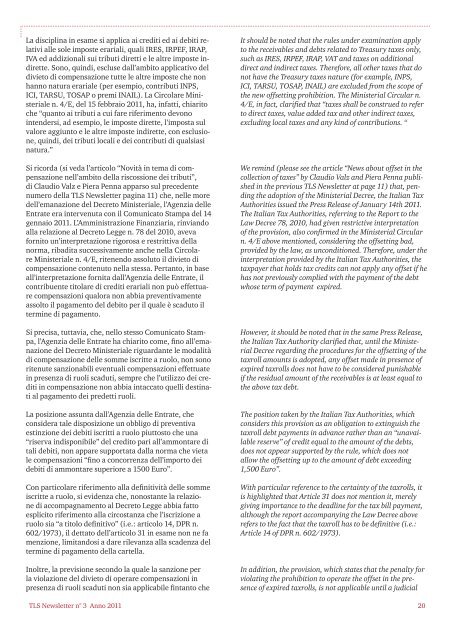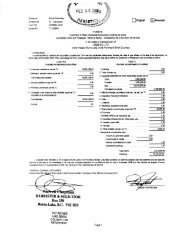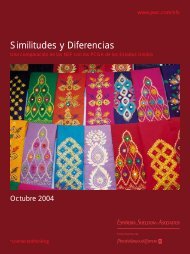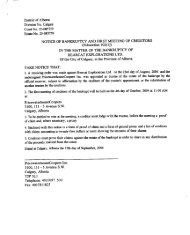TLS Newsletter 11 marzo 2011 - PwC
TLS Newsletter 11 marzo 2011 - PwC
TLS Newsletter 11 marzo 2011 - PwC
You also want an ePaper? Increase the reach of your titles
YUMPU automatically turns print PDFs into web optimized ePapers that Google loves.
La disciplina in esame si applica ai crediti ed ai debiti relativi<br />
alle sole imposte erariali, quali IRES, IRPEF, IRAP,<br />
IVA ed addizionali sui tributi diretti e le altre imposte indirette.<br />
Sono, quindi, escluse dall’ambito applicativo del<br />
divieto di compensazione tutte le altre imposte che non<br />
hanno natura erariale (per esempio, contributi INPS,<br />
ICI, TARSU, TOSAP o premi INAIL). La Circolare Ministeriale<br />
n. 4/E, del 15 febbraio 20<strong>11</strong>, ha, infatti, chiarito<br />
che “quanto ai tributi a cui fare riferimento devono<br />
intendersi, ad esempio, le imposte dirette, l’imposta sul<br />
valore aggiunto e le altre imposte indirette, con esclusione,<br />
quindi, dei tributi locali e dei contributi di qualsiasi<br />
natura.”<br />
Si ricorda (si veda l’articolo “Novità in tema di compensazione<br />
nell’ambito della riscossione dei tributi”,<br />
di Claudio Valz e Piera Penna apparso sul precedente<br />
numero della <strong>TLS</strong> <strong>Newsletter</strong> pagina <strong>11</strong>) che, nelle more<br />
dell’emanazione del Decreto Ministeriale, l’Agenzia delle<br />
Entrate era intervenuta con il Comunicato Stampa del 14<br />
gennaio 20<strong>11</strong>. L’Amministrazione Finanziaria, rinviando<br />
alla relazione al Decreto Legge n. 78 del 2010, aveva<br />
fornito un’interpretazione rigorosa e restrittiva della<br />
norma, ribadita successivamente anche nella Circolare<br />
Ministeriale n. 4/E, ritenendo assoluto il divieto di<br />
compensazione contenuto nella stessa. Pertanto, in base<br />
all’interpretazione fornita dall’Agenzia delle Entrate, il<br />
contribuente titolare di crediti erariali non può effettuare<br />
compensazioni qualora non abbia preventivamente<br />
assolto il pagamento del debito per il quale è scaduto il<br />
termine di pagamento.<br />
Si precisa, tuttavia, che, nello stesso Comunicato Stampa,<br />
l’Agenzia delle Entrate ha chiarito come, fino all’emanazione<br />
del Decreto Ministeriale riguardante le modalità<br />
di compensazione delle somme iscritte a ruolo, non sono<br />
ritenute sanzionabili eventuali compensazioni effettuate<br />
in presenza di ruoli scaduti, sempre che l’utilizzo dei crediti<br />
in compensazione non abbia intaccato quelli destinati<br />
al pagamento dei predetti ruoli.<br />
La posizione assunta dall’Agenzia delle Entrate, che<br />
considera tale disposizione un obbligo di preventiva<br />
estinzione dei debiti iscritti a ruolo piuttosto che una<br />
“riserva indisponibile” del credito pari all’ammontare di<br />
tali debiti, non appare supportata dalla norma che vieta<br />
le compensazioni “fino a concorrenza dell’importo dei<br />
debiti di ammontare superiore a 1500 Euro”.<br />
Con particolare riferimento alla definitività delle somme<br />
iscritte a ruolo, si evidenza che, nonostante la relazione<br />
di accompagnamento al Decreto Legge abbia fatto<br />
esplicito riferimento alla circostanza che l’iscrizione a<br />
ruolo sia “a titolo definitivo” (i.e.: articolo 14, DPR n.<br />
602/1973), il dettato dell’articolo 31 in esame non ne fa<br />
menzione, limitandosi a dare rilevanza alla scadenza del<br />
termine di pagamento della cartella.<br />
Inoltre, la previsione secondo la quale la sanzione per<br />
la violazione del divieto di operare compensazioni in<br />
presenza di ruoli scaduti non sia applicabile fintanto che<br />
It should be noted that the rules under examination apply<br />
to the receivables and debts related to Treasury taxes only,<br />
such as IRES, IRPEF, IRAP, VAT and taxes on additional<br />
direct and indirect taxes. Therefore, all other taxes that do<br />
not have the Treasury taxes nature (for example, INPS,<br />
ICI, TARSU, TOSAP, INAIL) are excluded from the scope of<br />
the new offsetting prohibition. The Ministerial Circular n.<br />
4/E, in fact, clarified that “taxes shall be construed to refer<br />
to direct taxes, value added tax and other indirect taxes,<br />
excluding local taxes and any kind of contributions. “<br />
We remind (please see the article “News about offset in the<br />
collection of taxes” by Claudio Valz and Piera Penna published<br />
in the previous <strong>TLS</strong> <strong>Newsletter</strong> at page <strong>11</strong>) that, pending<br />
the adoption of the Ministerial Decree, the Italian Tax<br />
Authorities issued the Press Release of January 14th 20<strong>11</strong>.<br />
The Italian Tax Authorities, referring to the Report to the<br />
Law Decree 78, 2010, had given restrictive interpretation<br />
of the provision, also confirmed in the Ministerial Circular<br />
n. 4/E above mentioned, considering the offsetting bad,<br />
provided by the law, as unconditioned. Therefore, under the<br />
interpretation provided by the Italian Tax Authorities, the<br />
taxpayer that holds tax credits can not apply any offset if he<br />
has not previously complied with the payment of the debt<br />
whose term of payment expired.<br />
However, it should be noted that in the same Press Release,<br />
the Italian Tax Authority clarified that, until the Ministerial<br />
Decree regarding the procedures for the offsetting of the<br />
taxroll amounts is adopted, any offset made in presence of<br />
expired taxrolls does not have to be considered punishable<br />
if the residual amount of the receivables is at least equal to<br />
the above tax debt.<br />
The position taken by the Italian Tax Authorities, which<br />
considers this provision as an obligation to extinguish the<br />
taxroll debt payments in advance rather than an “unavailable<br />
reserve” of credit equal to the amount of the debts,<br />
does not appear supported by the rule, which does not<br />
allow the offsetting up to the amount of debt exceeding<br />
1,500 Euro”.<br />
With particular reference to the certainty of the taxrolls, it<br />
is highlighted that Article 31 does not mention it, merely<br />
giving importance to the deadline for the tax bill payment,<br />
although the report accompanying the Law Decree above<br />
refers to the fact that the taxroll has to be definitive (i.e.:<br />
Article 14 of DPR n. 602/1973).<br />
In addition, the provision, which states that the penalty for<br />
violating the prohibition to operate the offset in the presence<br />
of expired taxrolls, is not applicable until a judicial<br />
<strong>TLS</strong> <strong>Newsletter</strong> n° 3 Anno 20<strong>11</strong> 20
















